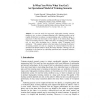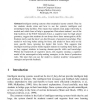ITS
2000
Springer
14 years 3 months ago
2000
Springer
To meet the needs for large-scale, high-quality learning contents, needless to say, we have to sharpen authoring tools. Authoring process can be roughly divided into two phases, a ...
ITS
2000
Springer
14 years 3 months ago
2000
Springer
We developed a distributed support model in an interface for distant learning. The support is integrated into the ExploraGraph navigator which makes it possible to navigate through...
ITS
2000
Springer
14 years 3 months ago
2000
Springer
The ability of an ITS to develop an accurate student model is inherently limited by the bandwidth of information available. We have completed an exploratory research project showin...
ITS
2000
Springer
14 years 3 months ago
2000
Springer
This paper reports a formative analysis of a Math Modeling Tool in the Algebra II Cognitive Tutor. This tutor is designed to support algebraic reasoning about real world problems. ...
ITS
2000
Springer
14 years 3 months ago
2000
Springer
Abstract. We discuss the design of an agent for coaching collaborative learning in a distance learning context. The learning domain is entity-relationship modeling, a domain in whi...
ITS
2000
Springer
14 years 3 months ago
2000
Springer
We present further results on the educational effectiveness of an intelligent computer tutor that helps students learn effectively from examples by coaching self-explanation
ITS
2000
Springer
14 years 3 months ago
2000
Springer
With the rise of VR, the internet, and mobile technologies and the shifts in educational focus from teaching to learning and from solitary to collaborative work, it's easy (bu...
ITS
2000
Springer
14 years 3 months ago
2000
Springer
Graphical representations have long been associated with more efficient problem solving. More recently, researchers have begun looking at how representation may affect the informat...
ITS
2000
Springer
14 years 3 months ago
2000
Springer
Intelligent tutoring systems often emphasize learner control: They let the students decide when and how to use the system's intelligent and unintelligent help facilities. This...
ITS
2000
Springer
14 years 3 months ago
2000
Springer



